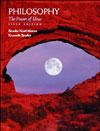| Alasdiar MacIntyre | A leading twentieth-century exponent of virtue ethics.
|
 |
 |
 |
| Analytic philosophy | The predominant twentieth-century philosophical tradition in English-speaking countries; analytic philosophy has its roots in British empiricism and holds that analysis is the proper method of philosophy.
|
 |
 |
 |
| Anarchism | A utopian political theory that seeks to eliminate all authority and state rule in favor of a society based on voluntary cooperation and free association of individuals and groups.
|
 |
 |
 |
| Applied ethics | Moral theory applied to specific contemporary moral issues, such as abortion, affirmative action, pornography, capital punishment, and so on.
|
 |
 |
 |
| Capitalism | An economic system in which ownership of the means of production and distribution is maintained mostly by private individuals and corporations.
|
 |
 |
 |
| Communism | The ideology of the Communist Party.
|
 |
 |
 |
| Communitarian | One who holds that there is a common good defined by one's society, the attainment of which has priority over individual liberty.
|
 |
 |
 |
| Conservatism | A political philosophy based on respect for established institutions and traditions and that favors preservation of the status quo over social experimentation.
|
 |
 |
 |
| Contractarian theory | The political theory according to which a legitimate states exists only by virtue of an agreement or "contract" among the subjects of the state.
|
 |
 |
 |
| Deontological ethics | Ethical theories according to which what I ought to do is whatever it is my moral duty to do.
|
 |
 |
 |
| Emotivism | The theory that moral (and other) value judgments are expressions of emotions, attitudes, and feelings.
|
 |
 |
 |
| Equivalence Thesis | The idea that letting people die of starvation is as bad as killing them.
|
 |
 |
 |
| Ethical relativism | The theory that there are no absolute and universally valid moral standards and values and that therefore the moral standards and values that apply to you are merely those that are accepted by your society.
|
 |
 |
 |
| Ethics | The branch of philosophy that considers the nature, criteria, sources, logic, and validity of moral value judgments.
|
 |
 |
 |
| Fascism | The totalitarian political philosophy of the Mussolini government in Italy, which stressed the primacy of the state and leadership by an elite who embody the will and intelligence of the people; the term is sometimes more generally used for any totalitarian movement.
|
 |
 |
 |
| G.E. Moore | The most important early figure in contemporary analytic ethics and metaethics. He held that goodness is an undefinable, noncomplex, and nonnatural property of good things. He said that what makes right actions right is that they produce more goodness than alternative actions.
|
 |
 |
 |
| Herbert Marcuse | A Marxist, held that the working class has been transformed from a force for radical change into a force for reserving the status quo because of the false needs created by consumerism and advertising.
|
 |
 |
 |
| Invisible-hand explanation | An explanation of a phenomenon as an unforeseen indirect consequence of action taken for some other purpose.
|
 |
 |
 |
| John Rawls | An analytic (liberal) political philosopher, attempted to establish the fundamental principles of distributive justice through consideration of a hypothetical "original position" in which people's choice of principles is not biased by their individual unique circumstances. He held that all social goods are to be distributed equally unless an unequal distribution is to everyone's advantage.
|
 |
 |
 |
| Liberalism | A political philosophy whose basic tenet is that each individual should have the maximum freedom consistent with the freedom of others.
|
 |
 |
 |
| Libertarian | Someone who believes in free will; alternatively, someone who upholds the principles of liberty of thought and action.
|
 |
 |
 |
| Metaethics | The philosophical investigation of the sources, criteria, meaning, verification, validation, and logical interrelationships of moral value judgments.
|
 |
 |
 |
| Normative ethics | A system of moral value judgments together with their justifications.
|
 |
 |
 |
| Original position | John Rawls's name for a hypothetical condition in which rational and unbiased individuals select the principles of social justice that govern a well-ordered society.
|
 |
 |
 |
| Prescriptive judgment | A statement that assigns a value to a thing; a value judgment.
|
 |
 |
 |
| Prima facie duty | In the philosophy of W.D. Ross, something it is in your moral duty to do unless it is overridden by a higher moral duty.
|
 |
 |
 |
| Robert Nozick | An analytic (libertarian) political philosopher, held that a limited "night-watchman" state is ethically justified but that any more extensive state violates people's rights.
|
 |
 |
 |
| Socialism | The theory that communal ownership of land, capital, and he means of production is the best way of serving the common good.
|
 |
 |
 |
| Veil of ignorance | In Indian philosophy, the perspective from which the world is viewed as a multiplicity of things; in John Rawls's philosophy, the metaphor for the conditions under which rational individuals are to select the principles of justice that govern the well-ordered society.
|
 |
 |
 |
| Virtue ethics | Ethical theories according to which what I ought to do is what the virtuous person would do; for virtue ethics, the primary question is, What kind of person ought I to be?
|
 |
 |
 |
| W.D. Ross | Held that the production of maximum good is not the only thing that makes an act right; some things are just simply our moral duty to do.
|



 2002 McGraw-Hill Higher Education
2002 McGraw-Hill Higher Education